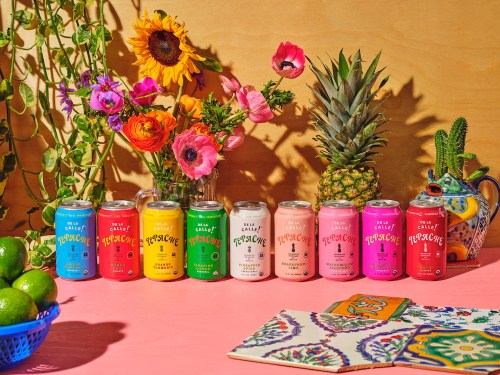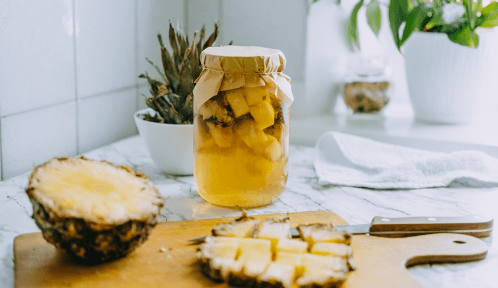Our editors independently select these products. Making a purchase through our links may earn Well+Good a commission
Achieving a well-balanced microbiome has become a top priority for many of late, as signs of a healthy gut have been linked to longevity, as well as lower instances of anxiety, depression, and risk of developing chronic conditions.
Experts in This Article
registered dietitian
registered dietitian and prenatal and postnatal health expert
co-founder of De La Calle
One gastroenterologist-approved way to achieve a healthier gut that couldn’t be more basic? Consuming gut-boosting fermented drinks, like tepache—a classic Mexican-style drink that’s naturally packed with probiotics.
I recently caught up with Rafael Martin del Campo, co-founder of De La Calle, a fermented and probiotic tepache beverage company, to learn more about the rich history of this drink and why its popularity is growing around the globe. Plus, I spoke with two registered dietitians who shared more about its impressive gut health benefits. And to really put tepache’s gut-giving magic to the test, I tried drinking it for two weeks straight to see its impact on my digestion and regularity…and let me say, much as I like piña coladas, this might be my new fave pineapple drink to get caught in the rain (you know, metaphorically) with.
What is tepache, and where does its rich history come from?
First things first: According to Martin del Campo, tepache is far from new. “Tepache has been around for many years, since prehispanic times. Although the way Tepache has been prepared has changed throughout the years, and recipes differ from region to region within Mexico,” he says. In Mexico, tepache is typically sold by street vendors and served in a plastic bag or a cup with a straw or in street markets, where you can find them in taco stands and tepacherías, dedicated tepache vendors.
Unlike kombucha (which is much more acidic and punchy in taste), tepache is the less bubbly and milder cousin of the drink, whose flavor is predominantly influenced by the additional ingredients used to make it (like herbs and citrus).
For Martin del Campo, tepache is symbolic, because it’s rooted in his ancestral background. “This drink represents Mexican culture and history. During Aztec times, tepache was fermented with staple ingredients such as corn,” he says. Once pineapple was introduced to the region, the original tepache-making method was adapted to include the fruit. Even the spiky pineapple rinds are used to make modern-day tepache, which Martin del Campo says is a great way to eliminate waste by upcycling the ingredients.
Martin del Campo explains that making delicious tepache is contingent upon a few things, but the most key component is keeping the centuries-old tradition alive. “The tradition of making Tepache is important to keep alive because it’s part of my culture—it’s part of food and beverage recipes that have been passed down through generations,” Martin del Campo says, who learned his original recipe from his grandmother. “With these passed-down traditions comes memories, happiness, and cultural identification.
“The tradition of making Tepache is important to keep alive because it’s part of my culture—it’s part of food and beverage recipes that have been passed down through generations,” Martin del Campo says, who learned his original recipe from his grandmother.
Honoring his ancestor’s traditions, Martin del Campo makes delicious tepache by fermenting a few ingredients, like organic pineapples (rinds included), spices, water, and sugar (piloncillo or panela). He also notes making it at home is far easier than you might imagine (here’s a video of how you can do it, too).
What are the gut health benefits of drinking tepache?
According to Lauren Manaker, MS, RDN, LD, CLEC, CPT, a registered dietitian based in Charleston, tepache is an A-plus drink for a gut health-supporting diet. “With both prebiotics and probiotics, these drinks pack a one, two punch in the gut health-supporting department. Prebiotic fibers act as fuel for the live probiotics that help support healthy gut microbiota,” Manaker says. She also notes that it’s an excellent alternative for those who don’t love the more acidic, potent taste of kombucha—but with equally great benefits.
Meanwhile, Christina Manian, RDN, a Boulder-based registered dietitian and sustainable food systems professional, agrees that tepache is great for the gut and helps reduce food waste. “Made from all parts of the pineapple, including the rind, this is a fermented beverage that delivers on probiotics—the healthy bacteria,” Manian says. “Whenever we consume probiotics, we’re boosting the population of beneficial bacteria in our gut microbiome. The gut microbiome is in charge of far more than just healthy digestion in the body—from our immune health to our brain health to the prevention of chronic disease—this community of over a trillion microorganisms is vital to our overall health and well-being.”

Originales Pack of 12 — $47.00
I tried drinking tepache, and it gave my digestion and regularity a major boost
If you like endless flavor choices, De La Calle will have you covered. The company, which launched in January 2020, first debuted with five main flavors—like Mango Chili, Ginger Manzana, and Tamarind Citrus—inspired by authentic Mexican flavor profiles. Today, the company offers even more options, like Chamoy and Prickly Pear Cactus. For me, the toughest part was picking a favorite. But if I had to choose, I was especially keen on the Mango Chili flavor, which was equally refreshing and exciting for my taste buds.
For two weeks, I added a can of tepache into my daily routine. I’ll admit drinking water and staying sufficiently hydrated is something I often struggle with—which also wreaks havoc on my digestion and regularity. So, when there’s a drink that boasts gut health benefits and can simultaneously help keep me hydrated, you bet I’m game. Drinking tepache was like a treat—it’s not too sweet, yet is far more enticing to sip on than a glass of water (at least for me). One of the things I love most about tepache is that, unlike kombucha, it doesn’t have caffeine—meaning that it’s the perfect drink to supplement my usual—also gut-healthy—cup of coffee.
Although I felt regular as ever and my digestion at ease during my two-week trial period, I can’t definitively say that tepache was the sole reason, considering I only consumed about a can per day. That said, the pros of consuming tepache outweigh any doubt. After all, the drink is packed with probiotics and prebiotics, helps me stay hydrated, and tastes absolutely delicious—which are all a win in my book and why I’ll keep sipping on tepache going forward.
An RD shares the benefits of drinking kombucha:
Sign up for the Well+Good SHOP Newsletter
Get exclusive deals on wellness, beauty, fitness, and food products that have been hand-picked by our editors.
Got it, you've been added to our email list.











